Tag: HVAC technician diploma

HVAC (Heating, Ventilation, and Air Conditioning) systems are integral to maintaining comfort in homes, offices, and other buildings. If you’re currently in HVAC technician training or considering this career path, it’s necessary to understand the various systems you’ll encounter in the field.
Remember, each type of HVAC system offers unique opportunities for technicians. Becoming proficient in these systems ensures you can handle various situations and meet your future clients’ needs. This blog post highlights five common types of HVAC systems you should be familiar with as a budding technician.
1. Be Familiar With Split Systems During and After Your HVAC Technician Training
Split systems are the most prevalent type of HVAC system in residential settings. Just as we highlighted in our HVAC technician courses at NATS, they are called “split” because they consist of components distributed both inside and outside the home.
The typical setup includes an outdoor unit containing the compressor and condenser coils and an indoor unit that houses the evaporator coils and air handler. This system is often paired with a furnace or air handler that circulates air throughout the building. As an HVAC technician, you must master both components’ installation, maintenance, and repair.
2. Hybrid Systems
Hybrid systems function similarly to split systems with a twist — they incorporate a heat pump that can provide heating and cooling. This system uses a furnace and a heat pump, which helps save on energy costs.
The heat pump operates on electricity and can heat and cool your home. Still, during colder weather, the system switches to furnace mode, usually powered by gas, making it more energy-efficient. Training in hybrid systems will involve understanding how to switch between the two energy sources seamlessly and efficiently.
3. Ductless Mini-Split Systems
Ductless mini-splits are becoming increasingly popular due to their efficiency and the ability to control temperatures in individual rooms. These systems do not require ductwork; they have an outdoor compressor, condenser, and one or more indoor air-handling units.
These units are connected by a conduit, which houses the power cable, refrigerant tubing, and a condensate drain. Installing and maintaining ductless systems during your HVAC technician training is crucial as more homes and businesses seek flexible and economical heating and cooling solutions.

4. Packaged Heating & Air Conditioning System
Packaged systems are typically found in buildings requiring more space for a split system’s separate components. In a packaged system, the compressor, condenser, and evaporator are all housed in a single unit, which is usually located on the roof or a concrete slab near the building’s foundation.
These units often include electric heating coils or a natural gas furnace, eliminating the need for a separate indoor furnace. Training will involve understanding how to safely install and maintain these larger units, often in challenging environments.

5. Geothermal Heat Pump Systems
Geothermal heat pump systems are considered one of the most cost-effective and sustainable options. These systems utilize the earth’s stable temperature to provide heating, cooling, and even hot water.
The system consists of an indoor handling unit and a series of pipes buried in the ground, known as a ground loop. Geothermal systems are highly efficient because they transfer heat between your home and the earth with a heat pump.
As these systems gain popularity for their energy efficiency and low operational costs, expertise in installing and maintaining them can be particularly valuable.
Interested in an HVAC technician diploma?
Contact NATS for more information.
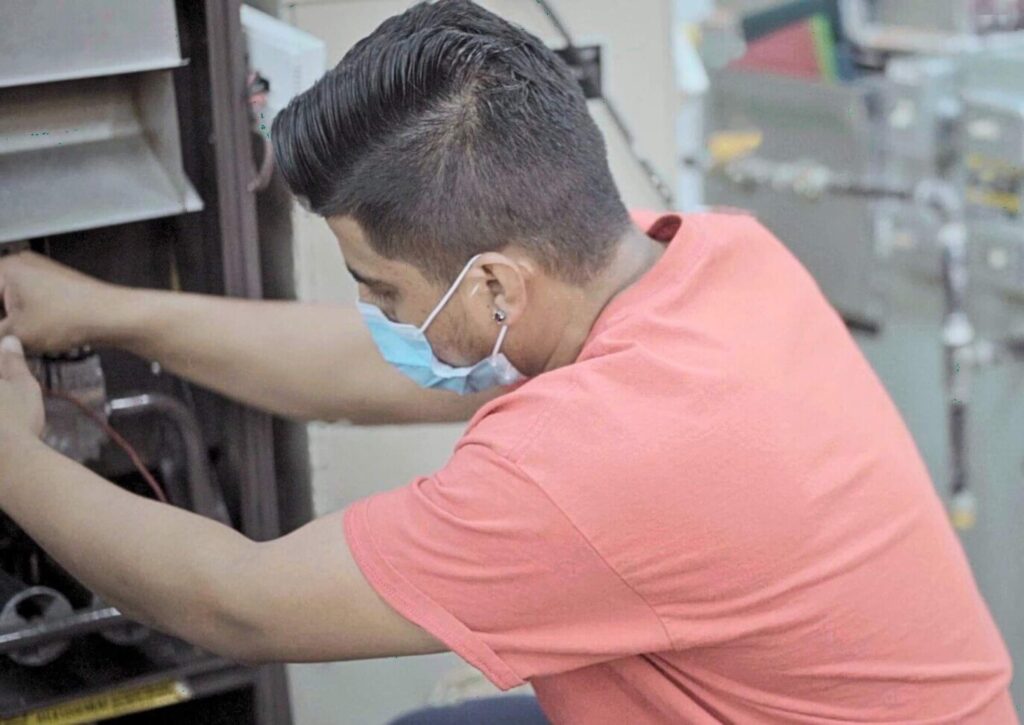
As technology advances and HVAC systems become more sophisticated, the demand for skilled troubleshooters in the industry will continue to grow. Therefore, ongoing training and practice in troubleshooting are essential for any HVAC technician aiming for success in this field.
The journey toward mastery in this field continues after completing HVAC technician training. One of the most critical skills that separates novice technicians from seasoned experts is the ability to troubleshoot HVAC systems effectively. It enhances job performance and customer satisfaction and ensures system efficiency, safety, and cost-effectiveness. This blog post explains why troubleshooting is indispensable in the HVAC industry.
The Necessity of Troubleshooting Skills
Troubleshooting is an essential part of HVAC work. It involves diagnosing and resolving problems in heating, ventilation, and air conditioning systems. This skill is crucial due to the complexity of HVAC systems, which can result in various issues. A technician’s ability to quickly and accurately identify and solve these problems can significantly impact system performance, customer satisfaction, and business reputation.
Enhancing Job Performance and Customer Satisfaction
Technicians skilled in troubleshooting after HVAC technician training can swiftly identify and resolve issues, which is crucial in minimizing client disruptions and inconvenience. This prompt response not only mitigates the downtime experienced by clients but also plays a significant role in boosting their satisfaction. Satisfied clients are more likely to share positive feedback and recommend the technician’s services, enhancing the technician’s reputation for reliability and expertise.
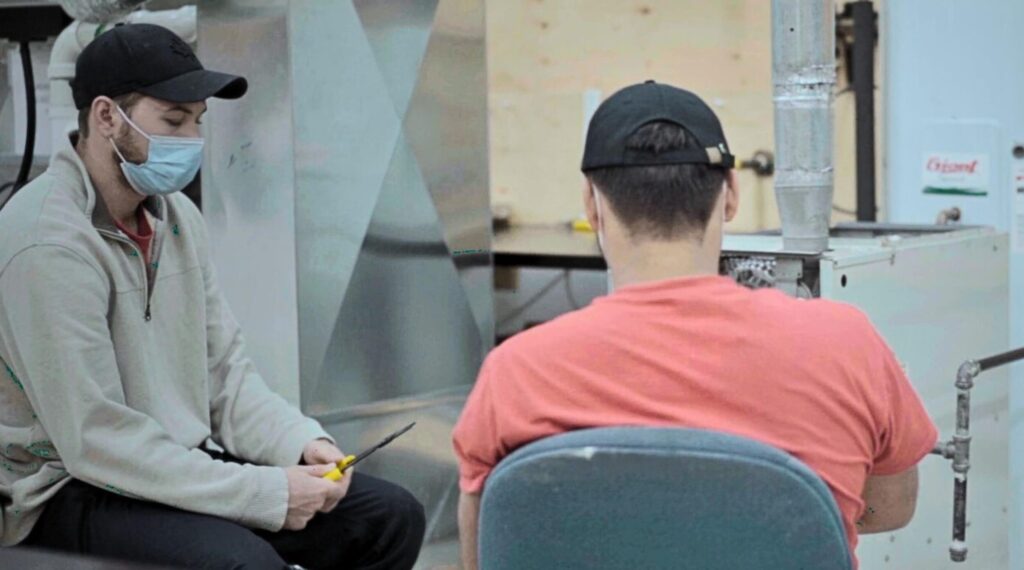
In an industry where reputation and word-of-mouth recommendations are vital, excelling in troubleshooting can be a key differentiator. It opens doors to new business opportunities and fosters career growth. By consistently displaying solid problem-solving abilities, technicians can establish themselves as trusted experts in their field, attracting a more extensive clientele base and potentially higher-profile projects. This virtuous cycle of proficiency, satisfaction, and growth underscores the importance of troubleshooting skills in the professional development of technicians.
HVAC Technician Training Emphasizes the Importance of System Efficiency and Safety
Proper troubleshooting is essential for ensuring that HVAC systems function efficiently. This meticulous process goes beyond mere repairs, playing a crucial role in conserving energy and significantly extending the lifespan of the equipment. Efficient troubleshooting is not just a matter of operational performance; it’s a critical safety measure. HVAC systems comprise complex electrical components, potentially hazardous refrigerants, and other elements that could pose significant risks if mishandled. It is essential to know the sequence of operation for the appliance you are diagnosing.
As our HVAC technician courses emphasize, accurate diagnosis and timely repair are imperative to minimize these risks. Doing this ensures the safety of the technicians working on these systems and the clients using them. This approach promotes a sustainable, energy-efficient, and safe environment, highlighting the importance of expertise and attention to detail in HVAC maintenance and repair.
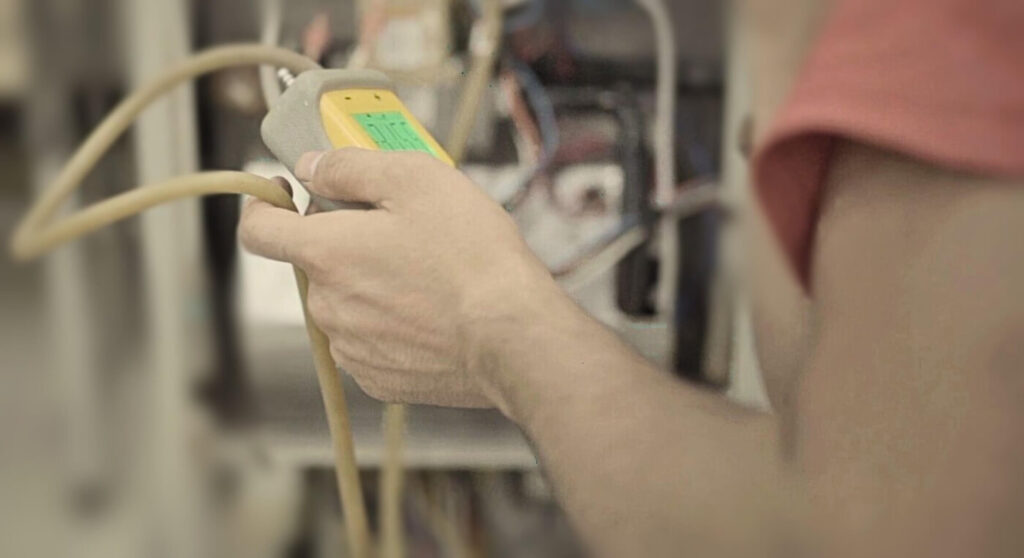
HVAC Trouble Shooting Ensures Cost-Effectiveness
The economic impact of adept troubleshooting in technical fields, particularly for HVAC technicians, is profound. When technicians are keen to diagnose and resolve issues accurately, it substantially reduces unnecessary replacements and repair expenses. This efficiency in troubleshooting is not only financially advantageous for the service provider but also for the customer.
Avoiding superfluous replacements means lower client costs, while service providers benefit from reduced expenditures on parts and labor. This mutually beneficial scenario highlights the significance of proficient troubleshooting skills. It contributes to a sustainable business model where cost-effectiveness is paramount, leading to greater customer loyalty and a more robust market reputation for the service provider. Effective troubleshooting is a cornerstone for financial prudence in the maintenance and repair sector, creating a win-win situation for both the service provider and their clientele.
Do you want to earn an HVAC technician diploma?
Contact NATS for more information.
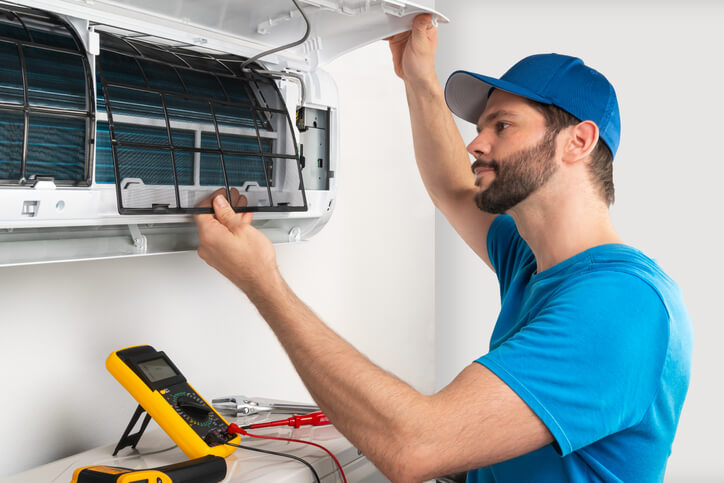
Heating, ventilation, and air conditioning (HVAC) systems are essential for maintaining comfortable indoor environments, but they can pose potential hazards if not handled properly. Proper training is crucial for ensuring safety when working with HVAC systems.
However, even after completing HVAC training, professionals can make safety mistakes that jeopardize their well-being and the well-being of those around them. In this blog post, we will discuss three common safety mistakes to avoid after HVAC training.
1. Neglecting Personal Protective Equipment (PPE)
One of the most fundamental safety mistakes HVAC professionals make is neglecting to wear appropriate personal protective equipment. PPE is essential to safeguard against potential hazards, such as electrical shock, refrigerant exposure, or cuts from sharp materials. After completing HVAC training, it’s crucial to remember that PPE is not optional but required for every job.
As our HVAC technician courses specify, the specific PPE needed can vary depending on the task. Still, it often includes safety glasses, gloves, steel-toed boots, and insulated electrical gloves for electrical work. Ignoring these safety measures can result in injuries that could have been easily prevented.
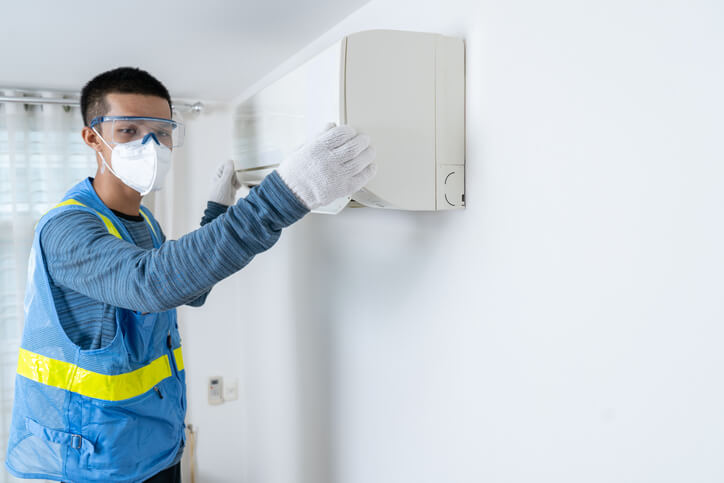
Additionally, HVAC technicians must be vigilant about the maintenance of their PPE. Regularly inspect and replace any damaged or worn items to ensure they remain effective. A small investment in PPE can prevent severe injuries and keep HVAC professionals safe on the job.
2. Skipping Safety Checks and Procedures
HVAC systems are complex, and the installation, maintenance, and repair processes involve various safety checks and procedures that should be followed rigorously. After completing HVAC technician training, technicians may become complacent or skip certain steps, thinking they can rely on their experience.
However, neglecting safety checks and procedures can lead to catastrophic consequences. For instance, failing to secure and test gas lines properly can result in gas leaks and potential explosions. Skipping the inspection of electrical connections can lead to electrocution or fires. Ignoring safety checks is not only dangerous but can also be costly in terms of property damage and potential lawsuits.
To avoid this safety mistake, HVAC professionals should always follow safety protocols and checklists provided by their employers or industry standards. These procedures are in place for a reason and are designed to protect technicians, clients, and property.
3. HVAC Technician Training Promotes Ensuring Adequate Equipment Inventory
As unlikely as this might seem, HVAC technicians can fail to maintain an adequate inventory of their tools and equipment. A well-prepared HVAC technician should have a comprehensive set of tools and materials to perform their job efficiently and safely. This aspect must be revised to avoid unnecessary delays, substandard work, and potentially hazardous situations.
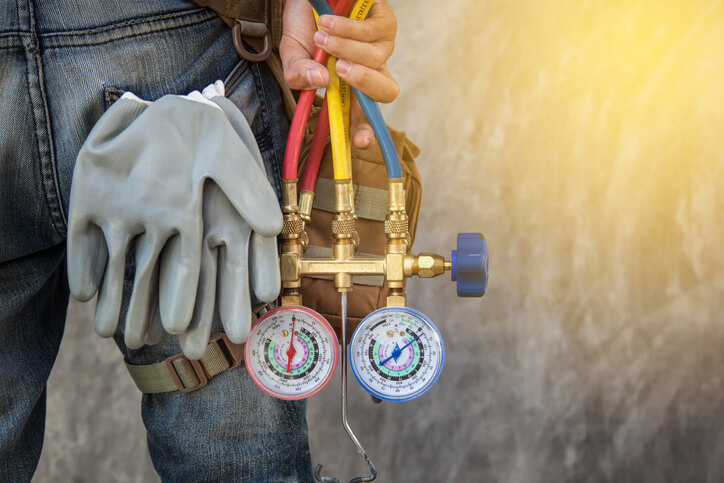
Some common inventory-related mistakes to avoid include:
- Lack of essential tools: Forgetting or not carrying crucial tools leads to improvisation, which can be unsafe. Always ensure you have the necessary tools, such as wrenches, screwdrivers, multimeters, and pipe cutters.
- Insufficient safety equipment: Many HVAC tasks involve working with electricity, refrigerants, or elevated positions. Neglecting safety equipment like gloves, safety glasses, fall protection gear, and arc flash suits can result in severe accidents.
- Disorganized work vehicle: Maintaining a well-organized work vehicle is vital for efficiency and safety. A cluttered and disorganized van can lead to accidents when tools or equipment are not stored securely.
Are you interested in our HVAC technician diploma?
Contact NATS for more information.
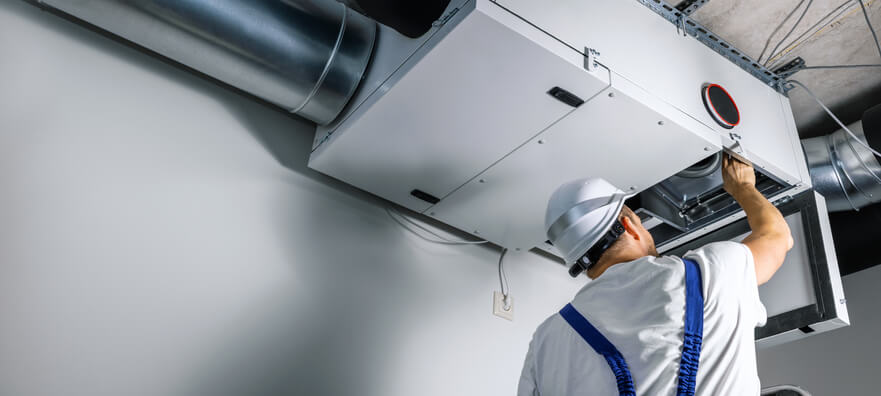
If you’re thinking about pursuing a career in the HVAC (Heating, Ventilation, and Air Conditioning) industry, you’re on track to enter a thriving field that offers a blend of hands-on work and technical problem-solving. But where do you start? How do you gain the necessary experience and exposure to decide if this is the right field for you? One often overlooked but highly beneficial position to consider is that of an HVAC Maintenance Assistant or HVAC Helper.
In this blog post, we’ll dive deep into what an HVAC Maintenance Assistant does, the benefits of starting in this position, and why it could be the ideal first step for aspiring HVAC professionals after your HVAC training.
What Is an HVAC Maintenance Assistant?
An HVAC Maintenance Assistant, often referred to as an HVAC Helper, is an entry-level position in the HVAC industry. As the name suggests, the primary role of this position is to assist HVAC technicians in their daily tasks. This can involve anything from handling tools, preparing work areas, and performing basic maintenance, to assisting with installations and repairs.
HVAC helpers focus on heating, cooling, and ventilation systems, assisting with tasks like inspecting equipment, installing humidifiers, preparing tools, cleaning air ducts, and maintaining company vehicles. They also handle the general upkeep of property interiors and exteriors. They ensure preventative maintenance is followed and assist with basic repairs across HVAC/R, plumbing, and electrical systems. Their duties also cover equipment repair, basic carpentry, furniture moving, and area maintenance like cleaning and lawn care. With the rise of clean energy systems, both roles need familiarity with electricity-based HVAC/R mechanics, such as heat pumps.
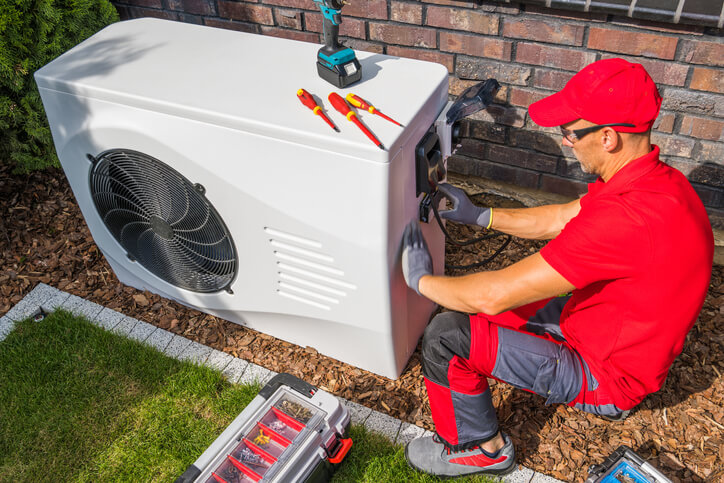
Why Consider Starting As An HVAC Maintenance Assistant?
Before committing to formal HVAC technician training or certifications, becoming an HVAC Helper offers a taste of the industry, granting invaluable first-hand experience of daily operations. This can be instrumental in gauging if the profession aligns with your aspirations. (this is generally not allowed. Most situations in hvac require a helper/assistant to already have the G3 certification)
Another notable advantage of beginning as an assistant is the “learn while you earn” model, a contrast to professions demanding early educational investments. This position also brings the opportunity for mentorship; by working alongside seasoned HVAC technicians, you gain access to a reservoir of knowledge and insights not always encapsulated in official training. Moreover, starting as an HVAC Helper is merely a foundation; with accrued experience and further training, there’s potential to ascend to more advanced roles, ranging from technician to management positions.
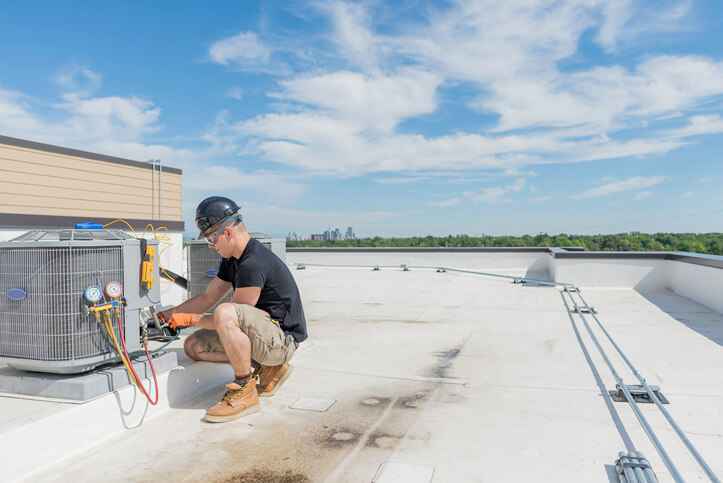
How to Become An HVAC Maintenance Assistant
HVAC helpers and maintenance assistants typically possess a high school diploma or GED, although formal education might not be a requirement for some. Previous experience is not usually mandatory, as workers often undergo a few weeks of on-the-job training to develop proficiency in their respective tasks.
(again this can be a bit misleading as a certificate is usually required to work on hvac systems and appliances.)
However, having vocational training in a relevant trade, understanding HVAC operations (particularly in energy-efficient technologies like heat pumps), or holding one to two years experience can give job seekers an edge, making them more appealing to employers compared to candidates without such qualifications.
Those aspiring to advance from these entry-level roles to become technicians or installers may consider applying for apprenticeship programs, pursuing vocational training, obtaining an HVAC technician diploma, or enrolling in courses provided by HVAC/R industry bodies, manufacturers, or distributors, with a focus on equipment and components used in clean energy systems.
Are you looking for a world-class HVAC technician college?
Contact NATS for more information.
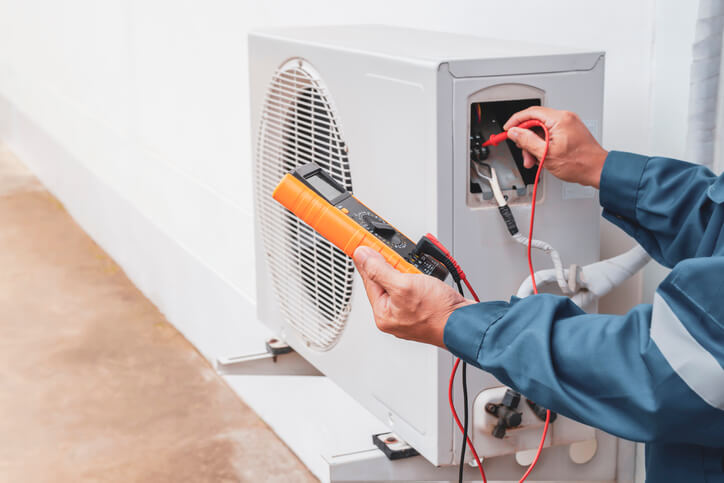
A technician is only as good as his tools, so the old saying goes. While an HVAC technician career is notable for its low entry barrier, quality tools are an indispensable expense for budding technicians. As a recent graduate entering the workforce and industry, you may need to manage your budget efficiently, particularly at the earliest stages of your career. One of the first steps in establishing yourself as a capable HVAC professional is assembling a toolkit that equips you for success without breaking the bank. This blog will explore how HVAC technician grads can build a comprehensive toolkit on a budget.
Prioritize Essential Tools While Exploring Budget-Friendly Brands
Start by identifying the essential tools required for your day-to-day tasks. A reliable set of basics includes a quality multimeter, screwdrivers, pliers, wire strippers, and a utility knife. These tools are the backbone of any HVAC technician’s arsenal and should be your first investment. Seek out affordable yet durable options to strike the right balance between quality and cost.
Several reputable brands offer high-quality tools at reasonable prices. Research and compare different brands to find the best value for your money. While investing in durable tools is essential, budget-friendly alternatives often perform just as well as their pricier counterparts.

Take Advantage of Starter Kits and Consider Second-Hand Options
Some manufacturers offer starter kits specifically designed for entry-level technicians. These kits often include various essential tools at a discounted price compared to purchasing each item individually. While you may eventually need to supplement your toolkit, these starter kits can be an excellent way to start without breaking the bank.
After your HVAC technician training, consider second-hand or refurbished tools in your toolkit quest. Seasoned technicians frequently upgrade their toolkits, allowing you to secure dependable tools at a significantly lower cost. Explore online marketplaces and local tool swaps, or tap into your professional network to unearth potential deals. In addition to stretching your budget, this approach will allow you to access quality tools with a proven track record, serving you well at the beginning of your HVAC career.
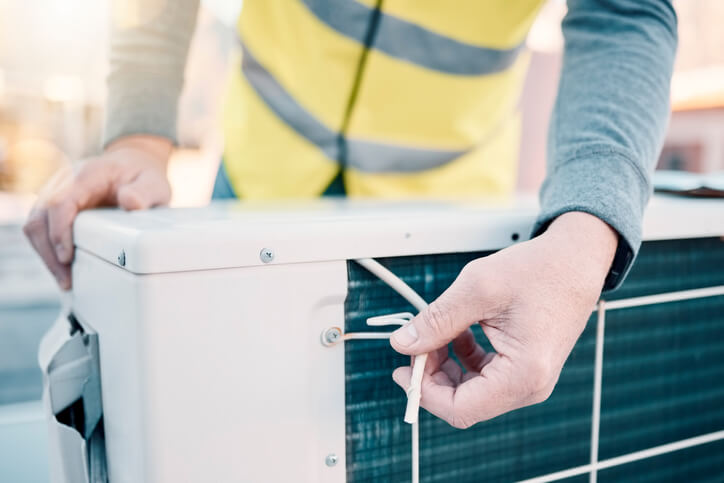
Build Gradually During Your HVAC Technician Training While Investing in Versatile Tools
When assembling a budget-friendly toolkit, focus on versatile tools that perform multiple functions. Opting for quality items like an adjustable wrench or a multi-bit screwdriver saves money and conserves valuable space in your toolkit. Choosing tools that can handle various tasks enhances efficiency and ensures you’re well-prepared for the diverse challenges you may encounter in your HVAC technician career.
Ultimately, assembling a toolkit is an ongoing process. Begin with fundamental tools and incrementally expand your collection as your budget permits. The advantage of this strategy is that it alleviates financial strain and allows you to determine which tools are essential for your specific job responsibilities. With this approach, you can tailor your toolkit to meet your evolving HVAC technician needs, ensuring a cost-effective and well-curated set of tools in the long run.
Interested in obtaining your HVAC technician diploma?
Contact NATS for more information.
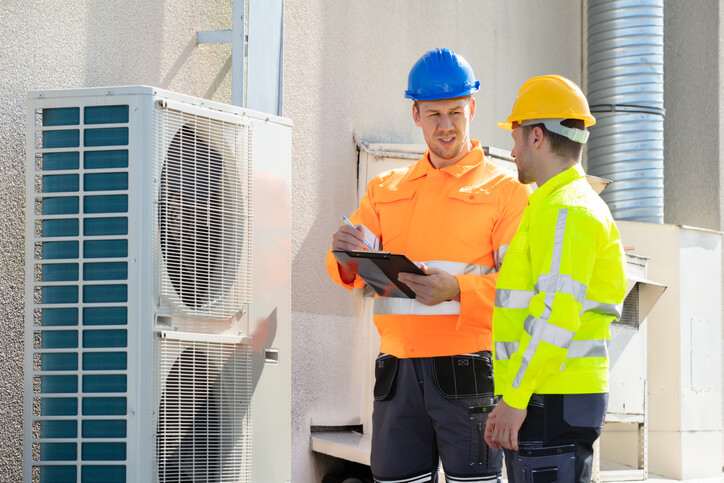
The journey to becoming a full-fledged HVAC Technician will require you to pass your Gas Technician exams. These exams provide a route to proving your professional competence and qualification in diploma and meeting key licensing requirements that prepare you for a lifetime of practice.
It is mostly by making the mark in these exams that you can give your career a big push, even after all the years of HVAC technician training and work experience. This is why it is important to prepare adequately for your Gas Technician exams. Here, we have provided a few crucial tips to help you prepare for and ace these exams. They are discussed below:
Create a Study Plan and Schedule and Stick to it Throughout HVAC Technician Training
To prepare adequately for your gas technician exams, you need to create a plan that’ll account for your study, practice, and other relevant exam conditions. You must try to settle on a study schedule and a comfortable study location and method that’ll give you enough room to cover sufficient grounds as well as a consistent process to fall back on. You may plan for a physical group study of your peers if you are comfortable with it or check into virtual forums.

Gather relevant study materials, practice resources, gas codes, and other resources that’ll help your course. Set out times for reviewing your learning materials from your HVAC technician training and taking on previous exam questions. And after setting up the schedule, make a conscious effort to follow through on it.
Extensively Review Your Training Materials
The notes, textbooks, and other learning resources from your HVAC Technician courses should provide a handy study guide for exam purposes. So you must go over these materials and get the entire gist of what they contain to prepare you for your upcoming exams. Get a solid grasp of the key concepts behind important topics and research supporting data to break them down into their base form.
You should find notes on such topics as piping systems, safe practices, local codes and regulations, gas heating basics, and other critical subjects. And when you do, ensure to review them in detail, making sure to note down important points and problem areas that you can seek further clarity on.
Practice Previous Exam Questions and Use Exam Prep Guides
Gas technician exams from previous years can provide a critical study/exam practice guide for most people. And by solving the problems from these exams repeatedly, you can set yourself up nicely for a successful exam. You’d be coming to terms with the likely exam questions and the topics they touch on while also familiarizing yourself with the exam format and other conditions.

By getting the right answers to these questions, you can get an even better understanding of your study materials. This is the same for exam prep books that focus on key areas. They can help you provide targeted learning and give you improved exam leverage.
Get Relevant Practical Experience
Some of your gas technician exams will test your appreciation of certain technical skills and knowledge relevant to your discipline. To give you a good chance of success in these exams, ensure to get as much hands-on practice as possible. Your HVAC diploma program should equip you with this practical experience, and further practice beyond the classroom can help you gain extra ground.
Try your hands on critical practical applications/skills like inspection of leaks, venting, and other HVAC installations. Practice with relevant work tools like fasteners, analyzers, cutters, and benders. Work on real-life scenarios that require your use of these skills and you’d be giving yourself a solid headstart in your upcoming exams and future work/career pursuits.
Are you interested in HVAC Technician training?
Explore the HVAC Technician diploma program at the North American Trade School (NATS).
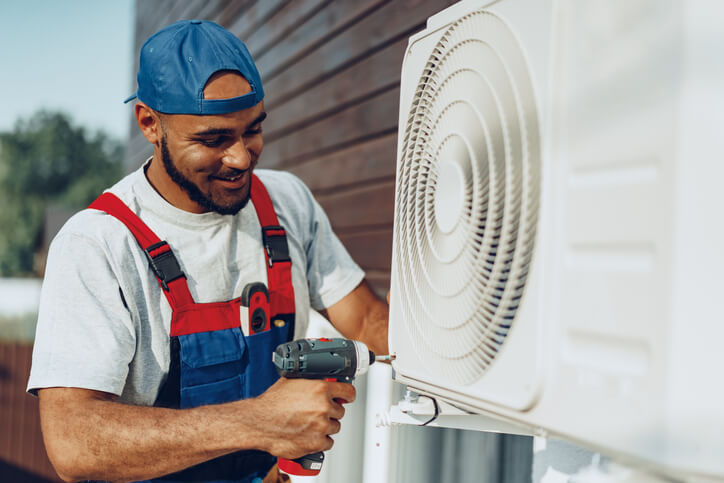
If you’re thinking of starting an HVAC career, there are many tools you’ll need to get acquainted with, as you’ll use them both during your training and throughout your career. In addition to basic hand tools that most tradespeople need to complete basic tasks, such as screwdrivers, power drills, hammers, and pliers, there are several industry-specific tools you’ll use. With the knowledge and skill to use these tools, your work will be done more efficiently. Read on for a brief introduction to some standard HVAC tools you’ll use after training.
Carbon Monoxide Detectors Are Essential for Safety
As an HVAC technician, you’ll come into contact with many different sources of carbon monoxide gas. These include leaking chimneys, back drafting from gas water heaters, wood burners, furnaces, generators, and any poorly maintained combustion device. Inhaling this deadly molecule deprives the body of oxygen, and in the case of carbon monoxide poisoning, you may only notice some mild symptoms like headache, dizziness, or fatigue. Since carbon monoxide gas is undetectable, you’ll need to use detectors. These devices sound an alarm when an unsafe amount of carbon monoxide is detected in the air. They can be life-saving.
Refrigeration Gauges Allow You to Manifold Gas and Liquid Pressure
After HVAC Technician training, you’ll use manifold gauges frequently. In fact, many consider them essential HVAC tools. They measure the pressure of liquids and gasses in a cooling system and are used primarily as a diagnostic tool, alerting you to any problems with the operation of a system. They can also be used as a service tool, releasing moisture, debris, or contaminated refrigerant from a system. Using a manifold gauge, you can add refrigerant to a cooling system. Digital gauges offer more efficiency and accuracy.
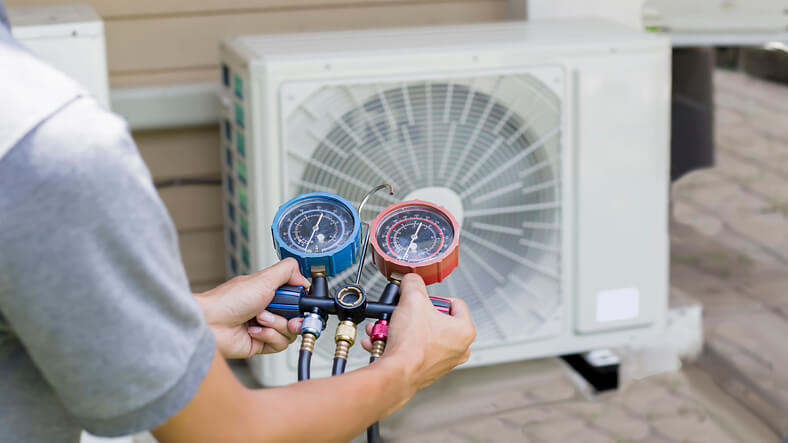
You’ll Use a Multimeter Regularly After HVAC Technician Training
Multimeters are essential tools that you’ll regularly use after completing HVAC courses. They are used for safety reasons to detect electrical current and notify you of the presence of voltage in order to protect you from electrocution. Multimeters also aid in the troubleshooting of electrical components within a cooling system, like switches, wires, and outlets. It’s important that you use a multimeter specifically designed for HVAC technicians with a thermocouple (air temperature sensor) with a 1000-degree range. HVAC multimeters should also have attachments that are compatible with the electrical components of ventilation systems.
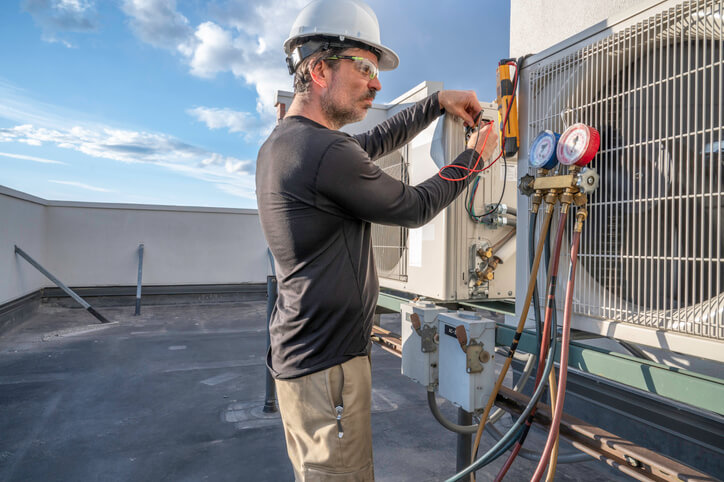
HVAC Software Will Help You Streamline Your Workflow
As an HVAC technician, your success depends greatly on your ability to manage your time, keep track of your invoicing, and maintain good customer relationships. Industry-specific business software can help you greatly improve your efficiency. Software tools that feature drag-and-drop scheduling streamline the invoicing process, and customer relationship management technology are great options you might work within your career.
Our HVAC Technician diploma program is designed to prepare students for the G3 and G2 Gas Technician exam with hands-on training from expert instructors. North American Trade Schools is accredited by the Technical Standards and Safety Authority (TSSA). The TSSA promotes and enforces public safety in Ontario. Our HVAC Technician Diploma Program and all of the career training programs we offer meet the standards set by the TSSA, meaning that you can trust us to provide all the skills needed to become a certified HVAC technician.
Are you ready to attain your HVAC Technician diploma?
Contact NATS to find out how you can get started.
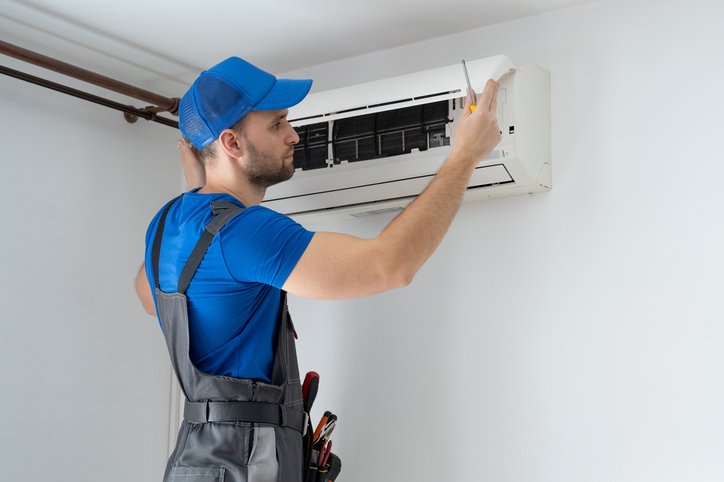
An HVAC Technician is a skilled professional that installs, repairs, and maintains, heating, ventilation, air conditioning, and refrigeration units. If you are considering becoming an HVAC Technician, there are certain safety principles you will need to know and remember. Once you start your career, you will find that you’ll be working with noxious gasses and electrical systems, and as such, you’ll need to remember safety protocols to avoid any harm. Read on for some safety practices you’ll want to remember throughout your training and career.
Wear PPE After HVAC Technician Training
As an HVAC Technician, you are likely to be exposed to noxious fumes, as well as other particles such as dust, debris, and chemicals which may cause harm. It is essential always to wear personal protective equipment (PPE) while you work. For instance, a respirator will help protect you against fumes, and safety goggles can help protect your eyes against any debris or harmful liquids. Other important PPE you may need as an HVAC Technician includes:
- Safety gloves
- A hard hat
- Non-slip shoes
- Earplugs
During your HVAC Technician Diploma program, you will learn the importance of protective gear, including how it should be worn and why it is needed in different scenarios. For example, wearing earplugs when working in a loud environment can help avoid damaging your hearing. Always wearing your safety gear on the job will help prevent you from suffering serious harm.
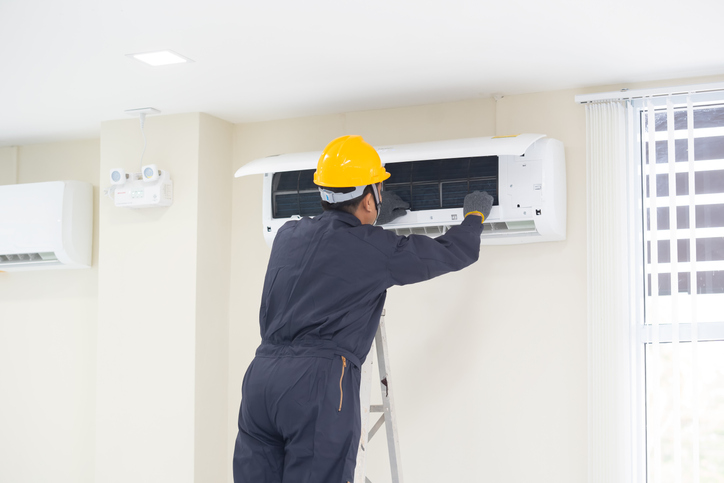
Be Cautious When Handling Chemicals
An important safety practice to always consider while working as an HVAC Technician is to be cautious with chemicals. You will be working with chemicals daily, and some, such as solvents and refrigerants, can be very harmful if not handled correctly. They may cause burns or in some severe cases, poisoning. During HVAC Technician training, you will be taught how to handle these chemicals safely.
Practical examples will be given and overseen by instructors, where you will need to dispose of, replace, and transport chemicals safely. This will be done using the knowledge of rules and regulations you learn during your training. For example, you’ll learn how to remove and store refrigerant chemicals safely.

Turn Off the Electricity While you Work
When working with units that have a water system or have general electrical issues, it is safer to turn off the main circuit breaker before starting work. Water is a conductor of electricity and can cause electrocution. Water leaking onto the unit you are working on may also be damaging to the unit, as it may cause a short circuit. This can be not only damaging for the unit but is a safety and fire hazard, as well. Additionally, it will be essential to analyze a unit before you begin working on it to see if there are any fluid leaks. This will help you better understand if you need to turn off the main circuit breaker.
The HVAC training you receive at NATS will help you identify leaks, teach you how to fix them, and help you understand the safety practices to follow throughout your career.
Are you ready to begin training for your HVAC Technician career?
Contact NATS to learn how you can get started!



